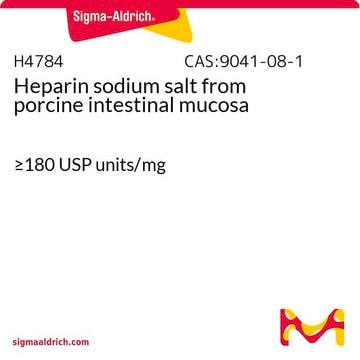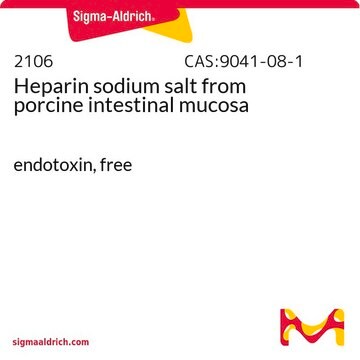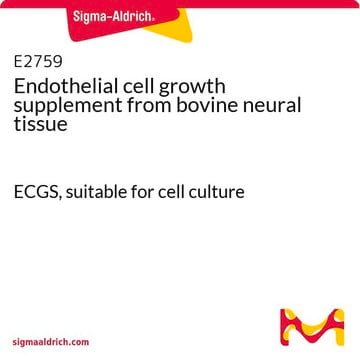H3393
Heparin sodium salt from porcine intestinal mucosa
Grade I-A, ≥180 USP units/mg
Synonym(s):
Sodium heparin
About This Item
Recommended Products
biological source
Porcine intestinal mucosa
Quality Level
type
Grade I-A
form
powder
specific activity
≥180 USP units/mg
color
beige
useful pH range
5.0 - 7.5
solubility
H2O: 50 mg/mL, clear, colorless to faintly yellow
application(s)
clinical research
diagnostic assay manufacturing
life science and biopharma
storage temp.
room temp
InChI key
JRTRSJGZMRQDHI-UHFFFAOYSA-N
Looking for similar products? Visit Product Comparison Guide
General description
Application
- to check the effect of heparin on FGF21 (fibroblast growth factor 21) signaling.
- in immunostaining of mice brain sections
- to quantify white blood cells and red blood cells in Sparus aurata blood samples
- in anticoagulation and severe acute respiratory syndrome coronavirus 2 (SARS-CoV2) inhibition assay
Biochem/physiol Actions
Heparin is synthesized in mast cells and mediators such as histamine and is associated with allergy and inflammatory activity. Heparin shows therapeutic effects against venous thrombosis and pulmonary embolism, helps in preventing re-thrombosis post thrombolysis, and manages arterial thrombosis in patients who suffer from acute myocardial infarction. Heparin shows anti-inflammatory action in many inflammatory conditions such as burns, bronchial asthma, and ulcerative colitis.
Other Notes
Recommended products
comparable product
related product
Storage Class Code
11 - Combustible Solids
WGK
WGK 2
Flash Point(F)
Not applicable
Flash Point(C)
Not applicable
Personal Protective Equipment
Choose from one of the most recent versions:
Certificates of Analysis (COA)
Don't see the Right Version?
If you require a particular version, you can look up a specific certificate by the Lot or Batch number.
Already Own This Product?
Find documentation for the products that you have recently purchased in the Document Library.
Customers Also Viewed
Articles
Uncover more about glycosaminoglycans and proteoglycans including the structure of glycosaminoglycans (GAGs), the different types of GAGs, and their functions.
Glycosaminoglycans are large linear polysaccharides constructed of repeating disaccharide units.
Our team of scientists has experience in all areas of research including Life Science, Material Science, Chemical Synthesis, Chromatography, Analytical and many others.
Contact Technical Service









